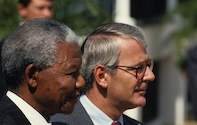Individual and Collective Wisdom
Mandela Said on his 89th birthday: “Let us call them Global Elders, not because of their age, but because of their individual and collective wisdom.

This group derives its strength not from political, economic or military power, but from the independence and integrity of those who are here.
They do not have careers to build, elections to win, constituencies to please. They can talk to anyone they please and are free to follow paths they deem right, even if hugely unpopular. “
A Dedicated Group of Leaders
He then described how Richard Branson, the man who built the Virgin Atlantic empire and who shares a birthday with Nelson Mandela, and British musician and activist Peter Gabriel put to him their idea of establishing a small, dedicated group of leaders, working objectively and without any vested personal interest in the outcome to solve difficult conflicts facing the world.
'Since then I have watched the concept grow, gain structure and strength and become a real, viable, and pragmatic initiative,' said Mandela. He went further to spell out how he saw them tackling their role: They will not take the easy, short-term route, but support long-term, sustainable approaches that address the root causes of the problems they tackle.
Motivated Problem Solvers
They are, I know, committed to working with local and indigenous knowledge; to listening and bringing together antagonists and protagonists; to working with anyone who is motivated to resolve a problem. They can help foster and introduce innovative ideas and little-known solutions to connect those who have real practical needs with those who have something to give.
Through their friends in the business, they can mobilise up to date technology and raise not only awareness of forgotten issues, but also help locate the resources to address them. But whatever techniques they use, I believe that in the end, it is kindness and generous accommodation that are the catalysts for real change. I know these esteemed friends of mine are capable of doing all these things.
Spirit of Ubuntu
Referring to Desmond Tutu, his co-author, as it were, of the enterprise, Mandela went on to say: And I expect that, if my friend the Archbishop has anything to do with it, they will insist on assuming the essential interdependence of all humankind. We call this the spirit of Ubuntu — that Profound African sense that we are human only through the humanity of other human beings.
I am confident that the Elders can become a real role model — leading, guiding and supporting all sorts of initiatives, both their own and those of many others. The Elders can speak freely and boldly, working both publicly and behind the scenes on whatever actions need to be taken.
Global Village Needs Leaders
It was Peter Gabriel who explained the title: In traditional societies, the elders always had a role in conflict resolution, long-term thinking and applying wisdom wherever it was needed. We are moving to this global village and yet we don't have our global elders. The Elders can be a group who have [sic] the trust of the world, who can speak freely, be fiercely independent and respond fast and flexibly in conflict situations.
Mandela, though a member of the Elders, gracefully withdrew from active participation. He commented, 'As I have said before, I am trying to take my retirement seriously and I will unfortunately not be able to participate in the really exciting part of their work, analysing problems, seeking solutions, searching out partners.’
 Former United States President Bill Clinton, paid tribute to Nelson Mandela during the 2007 Mandela birthday celebrations....
Former United States President Bill Clinton, paid tribute to Nelson Mandela during the 2007 Mandela birthday celebrations.... Desmond Tutu is one of South Africa’s most loved icons and is most known for being a human rights activist and a 1984 Nobel Prize winner. ...
Desmond Tutu is one of South Africa’s most loved icons and is most known for being a human rights activist and a 1984 Nobel Prize winner. ...